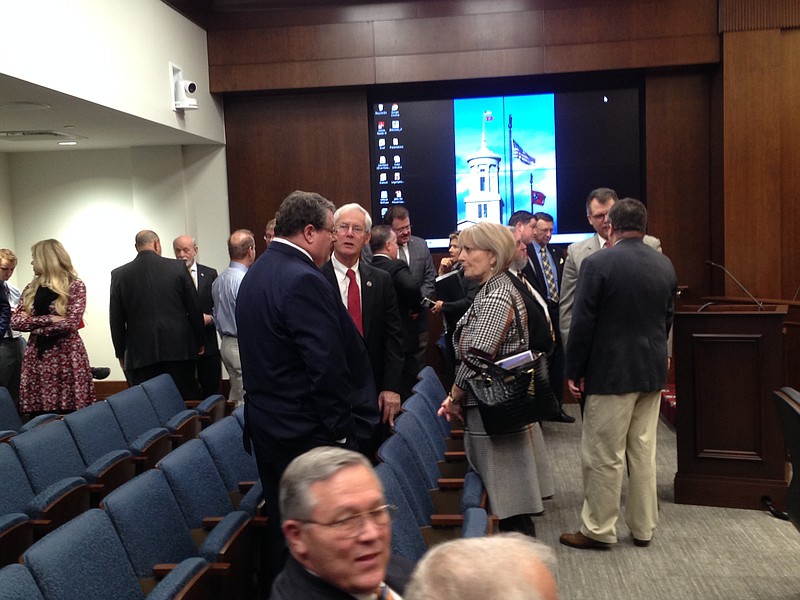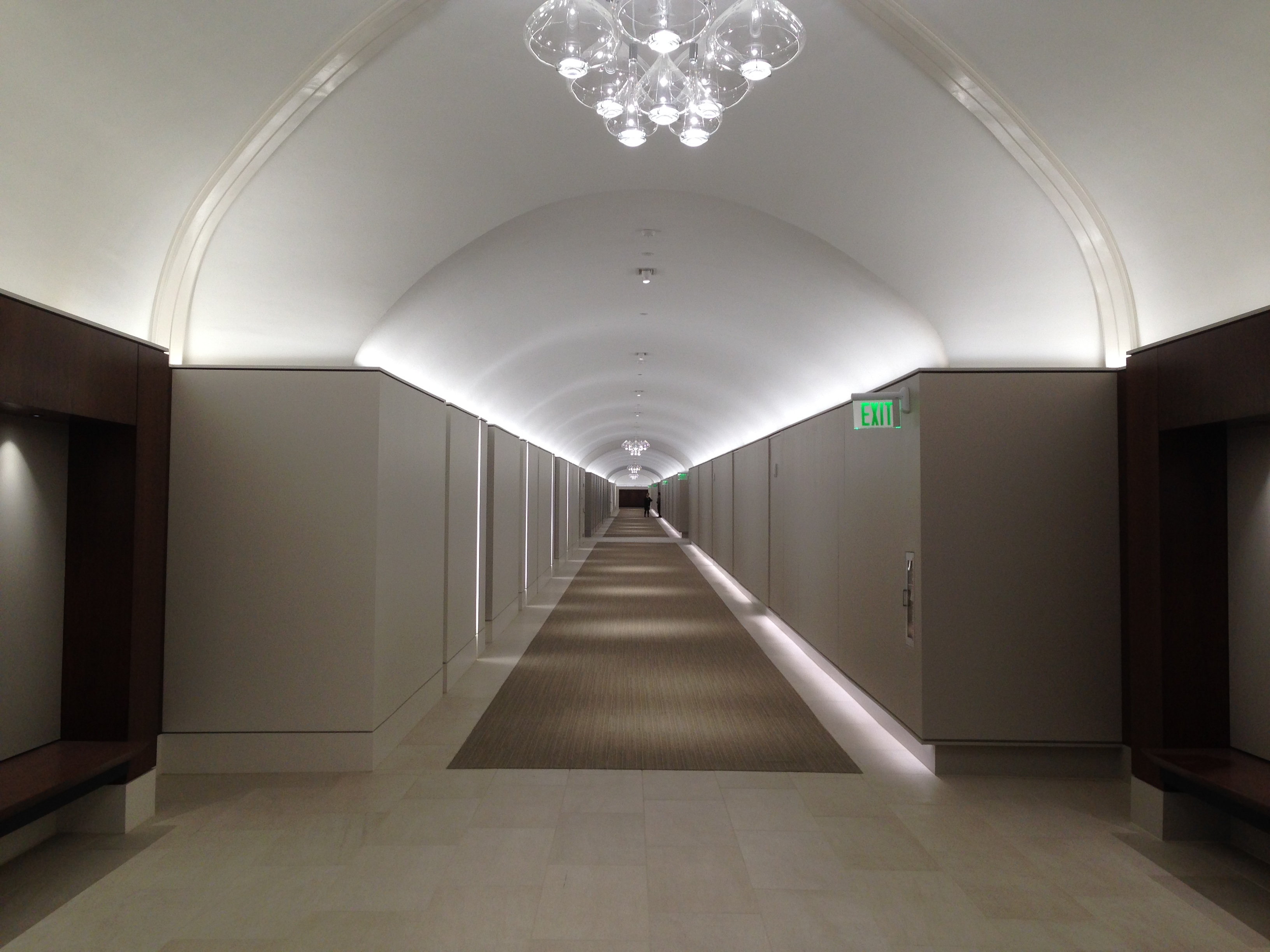NASHVILLE - There's a new player this year on Tennessee's Capitol Hill, and some think it will have an effect not just on how the 132-member General Assembly functions but also on visitors and those seeking to influence state policy.
What's new is the place where Tennessee's 99 representatives and 33 senators, hundreds of staffers, lobbyists and others will do much of their work.
In December, lawmakers left their 43-year-old home in the Legislative Plaza complex to take up residence in the 11-story, 479,142-square-foot Cordell Hull State Building, newly renovated at a cost of some $126 million.
Legislative Plaza - and adjoining space in the War Memorial Building - was where lawmakers had offices and where committees did much of their work, shaping legislation that later was passed into law in the actual House and Senate chambers, located in the state Capitol.
Gone are the dilapidated, cramped and dingy offices of the one-level Legislative Plaza, crammed with jury-rigged wiring and technology, not to mention mold and stained carpets.
Now, every lawmaker has his or her own office. Members are spread out on multiple floors. An entire floor is devoted solely to committee hearing rooms.
And there's plenty of other meeting-room space that can be reserved for constituents or interest groups. Not to mention more areas with furniture where tired visitors, including armies of school children, can take a rest.
"It's very spacious," said Sen. Mike Bell, R-Riceville. "I don't think there's a legislator, House or Senate, who can complain about not having enough seating room or being stuck down in the basement."
Everyone's "relieved to be out in the open air," added Bell. Still, he noted, "I think it does have a little bit of a corporate feel to it. The other building was much more intimate."
Rep. Gerald McCormick, R-Chattanooga, a former House majority leader, said he thinks that will provide members "a better chance to stay focused rather than being distracted and pulled away."
McCormick said he also likes Cordell Hull "from the standpoint that it's not embarrassing like the old building." Legislative Plaza was downright "embarrassing when you bring constituents in. The physical plant was literally rotting away, as you know," he added.
But for all the underground plaza's faults - including leaks from water fountains on the park-like plaza above - the old Legislative Plaza had more of an intimate feel, according to some lawmakers, staffers and lobbyists.
The one-floor building had one main corridor that ran the entire block. Escalators linked the plaza to the adjacent War Memorial Building, where a number of lawmakers had offices, too. Another escalator linked the building to the state Capitol. Elevators were located in the main public space, leading down to a legislative garage.
The plaza's committee meeting rooms flanked the main corridor, as did the House and Senate speakers' office suites. So did some lawmakers' offices, where two or three members might be in a single suite. Other offices were located on hallways spinning off from the main corridor. A large cafeteria was across the hall from the Senate speaker's office.
More than one legislative veteran likened it to a middle school, some positively and some negatively.
It was the sort of place where you might see a governor, U.S. senator or congressman strolling through or even an aspiring presidential candidate like Democrat Barack Obama dashing through, trying to dodge reporters as he visited top Democrats.
"You could stand out by the escalator and within what, 30 minutes or an hour, probably see 90 percent of the Legislature," Bell said. "Now there's no central place like that where you're going to be able to see people."
In a setting where communication is often key, Bell said he didn't see a number of House members until Thursday, a change from Legislative Plaza where members couldn't help running into each other nearly every day.
Still, the committee chairman called Cordell Hull "a great work space. I don't have to worry about scheduling a room when I have a number of constituents come in because my office can comfortably seat 20 people," he said.
As soon as the building opened in December, lobbyists began scoping out the new environment.
For example, House and Senate committee rooms are now located on the second floor with legislative offices spread out on three floors above. Representatives occupy two of those floors. Senators occupy the floor above them.
There are two members-only elevators. And behind House and Senate committee rooms, there's a members-only corridor running most of the length of the second floor. If members wish, they can enter and exit committees without encountering the public, lobbyists, reporters, executive branch officials, occasional protest groups or others.
Or at least until they return to their offices.
From some lobbyists' perspective, that means making more office appointments with lawmakers rather than relying on catching them on the fly.
Steve Bivens, a former Cleveland representative who now lobbies for a number of corporate clients, said he doesn't think the changes are such a big deal.
"I think once we get used to it, it's very user-friendly. It's very efficient," he said. "I like the way it's set up, the committee rooms all in one area."
Jim Wrye, who lobbies for the Tennessee Education Association, worked at Alabama's state Capitol before coming to the Volunteer State five years ago.
On first encountering Legislative Plaza, he said, "it reminded me of the worst middle school I ever taught in. Very little natural light, decrepit carpets and a single hallway going straight down. It was like, just, oh man."
Wrye said he thinks "it's a little too early to say how the dynamics will change if they will at all. Because when it's all said and done, it's about a person talking to a lawmaker about the issue and making a case on facts."
Some lobbyists, however, think it will result in a more Washington-style atmosphere where office appointments are more the norm.
After scouting out the building for lawmaker-hunting territory, some lobbyists are eyeing the new 500-foot-long Cordell Hull tunnel that links the building with the Capitol. Most lawmakers will travel it almost daily while in session. It's a good place to try to buttonhole members on the fly, several lobbying veterans said.
Members' secretaries and administrative assistants appear divided about the new building. Legislative Plaza's big cafeteria is gone, replaced with a "grab and go" pick-up operation. Some say they feel more isolated with less communication among peers. Others like what they see as a more sedate atmosphere.
House Speaker Beth Harwell, R-Nashville, said she believes the Cordell Hull building experience "is going to be much easier for the public to have accessibility. There's more seats in all the conference rooms.
"I think it's going to be much more open to the public, which is a good thing," added Harwell, who helped stave off plans by Gov. Bill Haslam's administration to rip down the historic 1954 building.
Lt. Gov. Randy McNally, R-Oak Ridge, the Senate speaker, said that based on the feedback he's getting, "I think most are very satisfied" with Cordell Hull.
Last week, McNally's huge 28-member Republican Caucus was able to fit pretty comfortably in a meeting room in his office. In Legislative Plaza, members, staffers and reporters were nearly in each other's laps in the speaker's conference room.
Regarding Tennessee's lobby corps, McNally observed, "I think they might have to walk a little bit more. But that's good for people."
While McCormick's generally positive about Cordell Hull, he said there's one new amenity he won't be using - the members-only corridor that runs behind committee meeting rooms.
"I found the secret passage way back there the other day," the Chattanoogan said. "I plan on walking in the hallway, being out in the public."
He added: "We don't have that on the floors where our offices are."
Contact Andy Sher at asher@timesfreepress.com or 615-255-0550. Follow him on Twitter @AndySher1.

